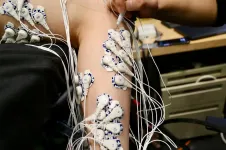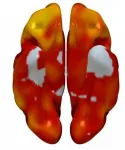Large-scale study finds genetic testing technology falsely detects very rare variants
2021-02-16
(Press-News.org) A technology that is widely used by commercial genetic testing companies is "extremely unreliable" in detecting very rare variants, meaning results suggesting individuals carry rare disease-causing genetic variants are usually wrong, according to new research published in the BMJ.
After hearing of cases where women had surgery scheduled after wrongly being told they had very rare genetic variations in the gene BRCA1 that could significantly increase risk of breast cancer, a team at the University of Exeter conducted a large-scale analysis of the technology using data from nearly 50,000 people. They found that the technology wrongly identified the presence of very rare genetic variants in the majority of cases.
The team analysed SNP chips, which test genetic variation at hundreds-of-thousands of specific locations across the genome. While excellent at detecting common genetic variation that can increase the risk of diseases such as type 2 diabetes, geneticists have long known they are less reliable at detecting rarer variation. However, this problem is less well known outside the genetic research community, and SNP chips are widely used by commercial companies that offer genetic testing direct to consumers.
Caroline Wright, Professor in Genomic Medicine at the University of Exeter Medical School, senior author on the paper, said: "SNP chips are fantastic at detecting common genetic variants, yet we have to recognise that tests that perform well in one scenario are not necessarily applicable to others. We've confirmed that SNP chips are extremely poor at detecting very rare disease-causing genetic variants, often giving false positive results that can have profound clinical impact. These false results had been used to schedule invasive medical procedures that were both unnecessary and unwarranted."
The team compared data from SNP chips with data from the more reliable tool of next generation sequencing in 49,908 participants of UK Biobank, and an additional 21 people who shared results of their consumer genetic tests via the Personal Genome Project.
The study concluded that SNP chips performed extremely well in detecting common genetic variants. However, the rarer the variation was, the less reliable the results became. In very rare variants, present in fewer than 1 in 100,000 individuals, typical of those causing rare genetic disease, 84 per cent were false positives in UK Biobank. In the data from commercial customers, 20 of 21 individuals analysed had at least one false positive rare disease-causing variant that had been incorrectly genotyped.
Dr Leigh Jackson, Lecturer in Genomic Medicine at the University of Exeter and co-author of the paper, said: "The number of false positives on rare genetic variants produced by SNP chips was shockingly high. To be clear: a very rare, disease-causing variant detected using a SNP chip is more likely to be wrong than right. Although some consumer genomics companies perform sequencing to validate important results before releasing them to consumers, most consumers also download their "raw" SNP chip data for secondary analysis, and this raw data still contain these incorrect results. The implications of our findings are very simple: SNP chips perform poorly for detecting very rare genetic variants and the results should never be used to guide a patient's medical care, unless they have been validated."
INFORMATION:
The paper published today in the BMJ is entitled 'Using SNP chips to detect very rare pathogenic variants: retrospective population-based diagnostic evaluation'.
Notes to editors: For further context, see the joint statement from the Royal College of General Practitioners and the British Society for Genetic Medicine on direct to consumer genomic testing, which references the pre-print version of the paper.
Once the embargo lifts, the paper will publish at: https://www.bmj.com/content/372/bmj.n214
*Labels applied according to the Academy of Medical Sciences press release labelling system.
About the University of Exeter Medical School
The University of Exeter Medical School is part of the University of Exeter's College of Medicine and Health. Our mission is to improve the health of the South West and beyond, through the development of high quality graduates and world-leading research that has international impact.
As part of a Russell Group university, we combine this world-class research with very high levels of student satisfaction. Exeter has over 19,000 students and is ranked 12th in The Times and Sunday Times Good University Guide 2020.
The University of Exeter Medical School's Medicine course is in the top 10 in the Complete University Guide 2020.
The College's Medical Imaging programme is ranked in the top 5 in the Guardian Guide 2020 and the Complete University Guide 2020.
The University of Exeter entered the world top 20 for Biomedical and Health Sciences in the CWTS Leiden Ranking 2019, based on the percentage of publications ranked in the top 10 per cent most cited.
https://medicine.exeter.ac.uk/
For further information:
Louise Vennells
Press and Media Manager
University of Exeter Medical School
+44 (0)1392 724927 or 07768 511866
l.vennells@exeter.ac.uk
ELSE PRESS RELEASES FROM THIS DATE:
2021-02-16
Recreational drinking, smoking, and drug use is linked to premature heart disease in young people, particularly younger women, finds research published online in the journal Heart.
Those who regularly use 4 or more substances are 9 times as likely to be affected, the findings indicate.
The numbers of new cases of heart disease (atherosclerotic cardiovascular disease) have been increasing in young adults, but the potential role of recreational substance use isn't entirely clear.
To probe this further, the researchers explored whether the recreational use of tobacco, cannabis, alcohol, and illicit drugs, such as amphetamine and cocaine, might be linked to prematurely and extremely prematurely furred up arteries.
They drew on information supplied ...
2021-02-16
Ageism, sexism, and Western ideals of the nuclear family have excluded grandmothers from national and international policy initiatives to save newborn lives in the Global South, suggests an analysis published in the online journal BMJ Global Health.
This is despite published research indicating that they are a valuable and influential resource for children's health and survival in many cultures, the study author points out.
Around three out of 4 newborn deaths in the Global South occur in the first week of life--40% of them on the first day, and most of them at home.
But ...
2021-02-16
Below please find summaries of new articles that will be published in the next issue of Annals of Internal Medicine. The summaries are not intended to substitute for the full articles as a source of information. This information is under strict embargo and by taking it into possession, media representatives are committing to the terms of the embargo not only on their own behalf, but also on behalf of the organization they represent.
1. Zika vaccine candidate shows promise in phase I trial
Abstract: https://www.acpjournals.org/doi/10.7326/M20-5306
Editorial: https://www.acpjournals.org/doi/10.7326/M21-0397
URL goes live when the embargo lifts
The Zika virus candidate, Ad26.ZIKV.001, a replication-incompetent human adenovirus serotype 26 (ad26) vector showed ...
2021-02-15
A new paper refines estimates of when herbivorous dinosaurs must have traversed North America on a northerly trek to reach Greenland, and points out an intriguing climatic phenomenon that may have helped them along the journey.
The study, published today in Proceedings of the National Academy of Sciences, is authored by Dennis Kent, adjunct research scientist at Columbia University's Lamont-Doherty Earth Observatory, and Lars Clemmensen from the University of Copenhagen.
Previous estimates suggested that sauropodomorphs -- a group of long-necked, herbivorous dinosaurs that eventually included Brontosaurus and Brachiosaurus ...
2021-02-15
Experts have devised a novel approach to selecting photos for police lineups that helps witnesses identify culprits more reliably.
In a paper published by the Proceedings of the National Academy of Sciences, researchers - from the University of California San Diego and Duke University in the United States and the University of Birmingham in the U.K. - show for the first time that selecting fillers who match a basic description of the suspect but whose faces are less similar, rather than more, leads to better outcomes than traditional approaches in the field.
The counterintuitive technique improves eyewitness performance by about 10 percent.
"In ...
2021-02-15
CAMBRIDGE, MA -- MIT researchers have invented a new type of amputation surgery that can help amputees to better control their residual muscles and sense where their "phantom limb" is in space. This restored sense of proprioception should translate to better control of prosthetic limbs, as well as a reduction of limb pain, the researchers say.
In most amputations, muscle pairs that control the affected joints, such as elbows or ankles, are severed. However, the MIT team has found that reconnecting these muscle pairs, allowing them to retain their normal push-pull ...
2021-02-15
The threat of landslides is again in the news as torrential winter storms in California threaten to undermine fire-scarred hillsides and bring deadly debris flows crashing into homes and inundating roads.
But it doesn't take wildfires to reveal the landslide danger, University of California, Berkeley, researchers say. Aerial surveys using airborne laser mapping -- LiDAR (light detection and ranging) -- can provide very detailed information on the topography and vegetation that allow scientists to identify which landslide-prone areas could give way during an expected rainstorm. This is especially ...
2021-02-15
More than one-third of the Corn Belt in the Midwest - nearly 100 million acres - has completely lost its carbon-rich topsoil, according to University of Massachusetts Amherst research that indicates the U.S. Department of Agricultural has significantly underestimated the true magnitude of farmland erosion.
In a paper published in the Proceedings of the National Academy of Sciences, researchers led by UMass Amherst graduate student Evan Thaler, along with professors Isaac Larsen and Qian Yu in the department of geosciences, developed a method using satellite ...
2021-02-15
The links between cardiovascular disease and cognitive impairment begin years before the appearance of the first clinical symptoms of either condition. In a study carried out at the Centro Nacional de Investigaciones Cardiovasculares (CNIC) in partnership with Santander Bank and neuroimaging experts at the Barcelonaβeta Brain Research Center (BBRC, the research center of the Fundación Pasqual Maragall), the investigators have identified a link between brain metabolism, cardiovascular risk, and atherosclerosis during middle age, years before the first appearance of symptoms.
The report, published in the Journal of the American College of Cardiology (JACC), ...
2021-02-15
Employing cardiovascular disease prevention strategies in mid-life may delay or stop the brain alterations that can lead to dementia later in life, according to a study in the Journal of the American College of Cardiology.
Atherosclerosis, or buildup of fats, cholesterol and other substances in and on artery walls, is the underlying cause of most cardiovascular diseases, which is the leading cause of death around the world. Dementia is also among the top causes of death and disability around the world, with 50 million people currently living with dementia. ...
LAST 30 PRESS RELEASES:
[Press-News.org] Large-scale study finds genetic testing technology falsely detects very rare variants



